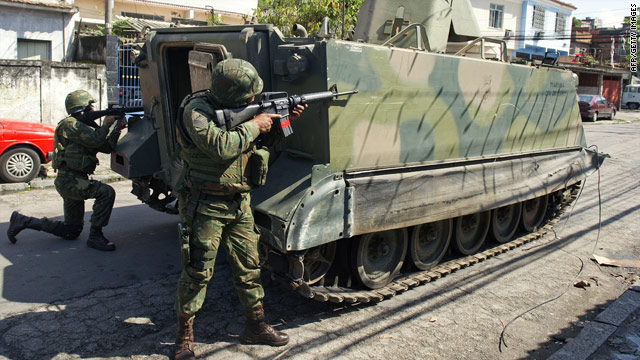Tempo de leitura: menos de 1 minuto
From the CNN Wire Staff
Rio de Janeiro, Brazil (CNN) — Authorities sent in [enviaram, recorreram a] the military [as forças armadas] to help authorities quell [conter] violence that continued Friday in the slums [favelas] of Rio de Janeiro in Brazil, with criminal gangs torching [incendiando] at least two more buses and five cars before dawn [amanhecer], state media reported [segundo órgãos da imprensa estatal].
At the Complexo do Alemao, or German Complex, in northern Rio [na zona norte da cidade], some [cerca de] 800 soldiers joined [se uniram a] hundreds of police [policiais] from the Special Operations Battalion, federal police and marines [fuzileiros navais], state-run [estatal] Agencia Brasil reported Friday.
Police and drug gangs exchanged shots [Houve troca de tiro entre a polícia e os traficantes] during the night.
Cf. Como digo “tráfego” e “tráfico” em inglês?
A key [importante] drug ring leader [líder do tráfico] in the German Complex, 24-year-old Thiago Ferreira Faria, was shot and killed [foi morto a tiros] during Friday’s police operations, according to [segundo o] Brazil’s military police website [site, sítio].
Earlier Friday [Na manhã de sexta], Defense Minister [o Ministro da Defesa] Nelson Jobim met [se reuniu] with the governor of Rio de Janeiro state, Sergio Cabral, and security authorities of the federal and state governments. The Army [Exército] agreed [concordou, aceitou] to make available [disponibilizar] 10 armored vehicles [veículos blindados] and the Navy [Marinha] offered three helicopters, according to the news agency [agência de notícias].

At least [No mínimo, Pelo menos] 35 people have died [morreram] and 197 have been detained or arrested [foram detidas ou presas] since violence broke out [começou, eclodiu] Sunday as a response by drug gangs [uma reação das gangues do tráfico] to an increased police presence [a uma maior presença da polícia] in the crime-ridden slums [nas favelas dominadas pelos criminosos], police said [segundo a polícia]. More than 96 vehicles have been burned [foram queimados].
Three police officers [policiais] have been injured [ficaram feridos], according to state military police [polícia militar estadual].
The soldiers were dispatched [foram enviados] to the city to protect the perimeter of the areas occupied by police, Jobim said.
But the military commander of the east [comandante militar do leste], Gen. Adriano Pereira Junior, said that if soldiers are attacked [se os soldados forem atacados], they will react [reagirão]. “Our initial goal [objetivo inicial] is to surround [cercar] the area, but if there’s confrontation, unfortunately [infelizmente] we’ll have to respond [responder, reagir] to the attack.”
The military plans to gain control [controlar] of all entry points [acessos] into some slums, the news agency said, citing [citando, mencionando] Roberto Sa, a state security official [autoridade de segurança do estado].
The continuing [contínuo, duradouro, persistente] unrest [distúrbio, perturbação (da ordem), protesto] stems from [é fruto de, resulta de] efforts by police [esforços da polícia, trabalho policial] to remove drug gang members from Rio’s thickly populated [muito populosas] slums [favelas (termo genérico)], called favelas [não é incomum o emprego da palavra “favela” em inglês para designar as favelas brasileiras].
Police began preparing early Friday for an incursion [incursão, invasão] into one called Vila Cruzeiro. They had surrounded [Ela (a polícia) havia cercado] the area since Thursday, when about 200 drug dealers [traficantes] fled [fugiram, baterem em retirada] toward [em direção a] nearby neighborhoods [bairros vizinhos, bairros próximos], terrifying residents [aterrorizando a população].
Cf. Substantivos: singular e plural
“I stayed [Fiquei] inside the house [dentro de casa] with my grandchildren [netos],” said Darcy Barbosa, who is retired [aposentada]. “We could not leave [Não dava para sair]. We slept [Dormimos] on the floor [no chão] to escape the bullets [para “fugir” das balas].”
What the police have described [O que a polícia descreve] as [como sendo] drug-dealer strongholds [os redutos do tráfico] are also home [os lares] to law-abiding residents [gente de bem, trabalhadores], many of whom [muitos dos quais] tried [tentaram] Friday to go about their routines [manter a rotina, viver normalmente, tocar a vida].
“Life continues [A vida continua],” said Simone Teodoro, who sells sodas [refrigerantes]. “People have to work, to go up [subir], to go down [descer], to sleep.”
Inside one slum were [foram encontrados] trucks [caminhões] and other vehicles that police said the drug dealers had used as barricades [barreiras, barricadas] to block the passage [impedir a passagem] of government tanks [dos tanques do governo]. Authorities were using cranes [guindastes] and other heavy equipment [outros equipamentos pesados] to remove them.
But police in Vila Cruzeiro were not in control [não tinha o control (da área)] Friday. Frequent machine gun bursts [disparos de metralhadora] could be heard. A police helicopter fired on [atirou] suspected drug dealers who fired back [responderam à bala, atiraram de volta].
Some residents ignored [não se importavam com], or pretended to ignore [fingiam não se importar com], the gunshots [tiros] emanating from [que vinham das] the hilltop redoubts [fortificações no alto do morro] under siege [sitiadas] by the police.
“I have to drop [Tenho que deixar] my children [filhos; filhas] with a girl [uma moça] who takes care of them [que cuida deles] so I can go to work [para que eu possa trabalhar],” said Roseane da Silva, a maid [empregada doméstica].
Police showed off [apresentou] dozens of [dezenas de; dúzias de (lit.)] motorcycles that had been stolen [haviam sido furtadas] and then hidden [escondidas] in a bread shop [padaria]. They also showed off seized [apreendidos] rifles, grenades, homemade bombs [bombas de fabricação caseira], cocaine, marijuana [maconha], a balance, bulletproof vests [coletes à prova de bala].
Most residents appeared [A impressão é a de que maioria dos moradores] to support [apoia] the government’s counteroffensive [contraofensiva], though they recognized [muito embora reconheçam que] it came at a high cost [ela tem um preço alto].
“We can’t even sleep at night [Não dá nem para dormir à noite],” said Cristiane Accioli, a telephone operator [telefonista]. “We close all the windows, afraid [com medo de] they they will invade.”
Brazilian President Luiz Inacio Lula da Silva reiterated [reiterou, reafirmou] his support [seu apoio] Thursday for state and local officials’ efforts [ao trabalho das autoridades estaduais e municipais], saying he had spoken [afirmando que havia conversado] with the governor of Rio de Janeiro state, Sergio Cabral. The city [Cidade] and the state [estado] have [têm] the same name.
“I told Sergio Cabral that whatever help [seja qual for a ajuda] he needs from the federal government so [para que] people [a população] will live in peace [viva em paz] in this country, we will give him,” Lula said. “Rio de Janeiro can rest assured [pode ter certeza] that we will support the governor and the residents of the state.”
Police said this week they had transferred [ela (a polícia) havia transferido] some prisoners [detentos] from local institutions [presídios locais] to federal lockups [presídios federais de segurança máxima] in other states, Agencia Brasil reported, citing Rio de Janeiro Public Security Secretary [Secretário de Segurança Pública] Jose Mariano Beltrame. Some of the prisoners being transferred ordered the violence [deram a ordem para os ataques] by drug gangs, Beltrame said.
He said two rival gangs joined forces [se uniram] to launch the attacks [realizar os ataques]. The security chief also said he mobilized all police in the city to try to restore order [restabelecer a ordem] and to step up [aumentar] police presence [o contingente policial] in 17 of Rio’s slums.
Agencia Brasil reported Brazil’s Marine Corps [Corpo de Fuzileiros Navais] sent armored vehicles, weapons [armas], ammunition and night-vision goggles [óculos de visão noturna] for use by Rio de Janeiro security forces at the request [atendendo a solicitação] of Cabral.
At least 47 public schools and 10 nurseries [creches] suspended classes [as aulas] Thursday, Agencia Brasil reported.
Officials [As autoridades] are concerned [estão preocupadas] about crime [com a violência] in Brazil as [porque] the nation prepares [se prepara] to host [sediar] the 2014 World Cup [Copa do Mundo] soccer tournament and the 2016 Summer Olympics [Jogos Olímpicos (de verão)], both of which will be held [serão realizados] in Rio.
Que palavras e expressões novas você aprendeu com o texto? Tem alguma outra sugestão de tradução? Quer esclarecer uma dúvida de vocabulário ou deixar uma mensagem de apoio aos cariocas? Use a seção de comentários abaixo à vontade! Obrigado. Leia também a lista com o vocabulário essencial para você falar sobre o assunto: Vocabulário sobre a violência no Rio.

Excellent text and explanation!!! I’ve learned a lot reading it. Thank you very much.
I’d like to tell you about a typo in the ninth paragraph:
“But the military commander… but if YOU there’s confrontation, unfortunately we’ll have to respond to the attack.”
The pronoun “YOU” in the above sentence.
Rose,
Obrigado pela observação. Já fiz a correção. Volte sempre!
Abraços a todos
I hope as all law-abiding person in RJ that we have a pacified city ASAP. I didnt know the words nurseries and the law-abiding. Thanks Teacher Ulisses!
Heitor,
Obrigado pelo feedback. Também estou na torcida para a volta à normalidade o quanto antes. Boa sorte!
Abraços a todos